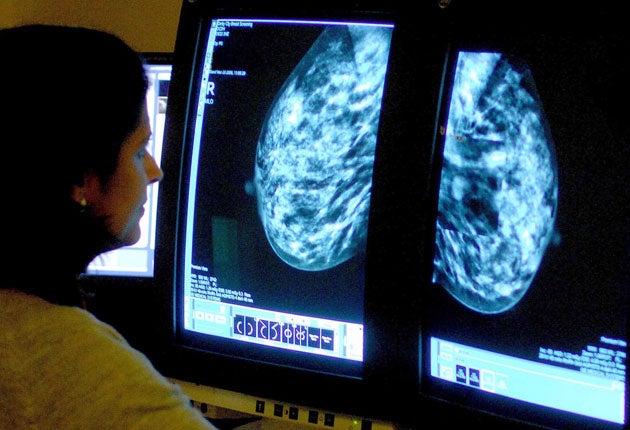High breast cancer rate among British women 'reflects lifestyle'

Your support helps us to tell the story
From reproductive rights to climate change to Big Tech, The Independent is on the ground when the story is developing. Whether it's investigating the financials of Elon Musk's pro-Trump PAC or producing our latest documentary, 'The A Word', which shines a light on the American women fighting for reproductive rights, we know how important it is to parse out the facts from the messaging.
At such a critical moment in US history, we need reporters on the ground. Your donation allows us to keep sending journalists to speak to both sides of the story.
The Independent is trusted by Americans across the entire political spectrum. And unlike many other quality news outlets, we choose not to lock Americans out of our reporting and analysis with paywalls. We believe quality journalism should be available to everyone, paid for by those who can afford it.
Your support makes all the difference.Britain has one of the highest rates of breast cancer in the world, ranking 11th out of 50 countries, according to a study that identifies high levels of obesity and alcohol consumption among women as one of the reasons.
Overall, Britain comes 22nd in the ranking for all cancers in both sexes, but women appear to be disproportionately affected – the UK comes 33rd for male cancers and 12th highest for female cancers. However, the analysis by the World Cancer Research Fund (WCRF) shows that rates of cancer overall are still higher in men than in women.
Denmark has the highest ranking, but this may be due to better diagnosis and reporting there (although Danish women do also have high rates of smoking and drinking).
On breast cancer, more women per 100,000 develop the disease in the UK (260.5) than in France (254.9), Italy (251.6), Germany (245.7), Sweden (241.2), Switzerland (236) or Spain (187). The highest rates are in Denmark (325.3), New Zealand (287.1) and Ireland (285.1).
All the rates are age-standardised, which allows a true comparison between countries.
The WCRF, which compiled the rankings from WHO data, said they showed that high-income countries generally have much higher cancer rates than do lower-income ones.
While this may be down to better diagnosis and data collection, high-income countries also have higher rates of obesity, drinking, and lower levels of exercise.
Many cancers are linked to these lifestyle factors, including those of the mouth and larynx, lung, stomach, pancreas, liver, bowel, breast, prostate and kidney. Professor Martin Wiseman, medical and scientific adviser for the WCRF, said: "We know that people in high-income countries are more likely to be overweight, to drink a lot of alcohol, and to be inactive.
"When you look at the list, it is clear that the countries that do worse for these factors tend to be nearer the top," he said.
He added that "The high incidence rates in the UK, Denmark and other high-income countries are not inevitable, and lifestyle changes can make a real difference to people's risk."
Professor Wiseman said that about a third of the most common cancers in the UK could be prevented by maintaining a healthy weight and by good nutrition and exercise.
"Of course, not smoking will have an important effect beyond that, as will avoiding sunburn," he said.
"But the bad news is that around the world things are heading in the wrong direction. The general trend is for people to become more overweight, to eat more high-energy foods and to become less active.
"This is why we need to raise awareness about what people can do to reduce their cancer risk, and as a society we need to make the kind of changes that will make it easier for people to make these healthy choices," Professor Wiseman said.
Join our commenting forum
Join thought-provoking conversations, follow other Independent readers and see their replies
Comments